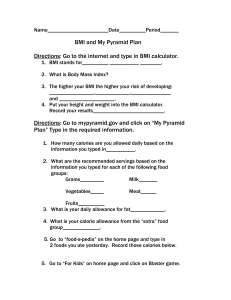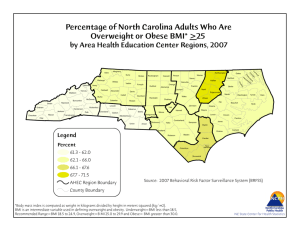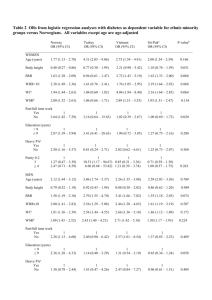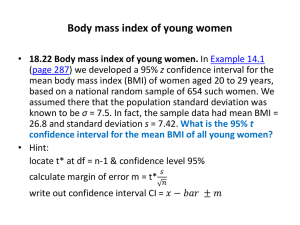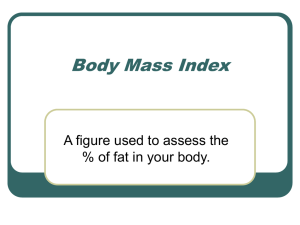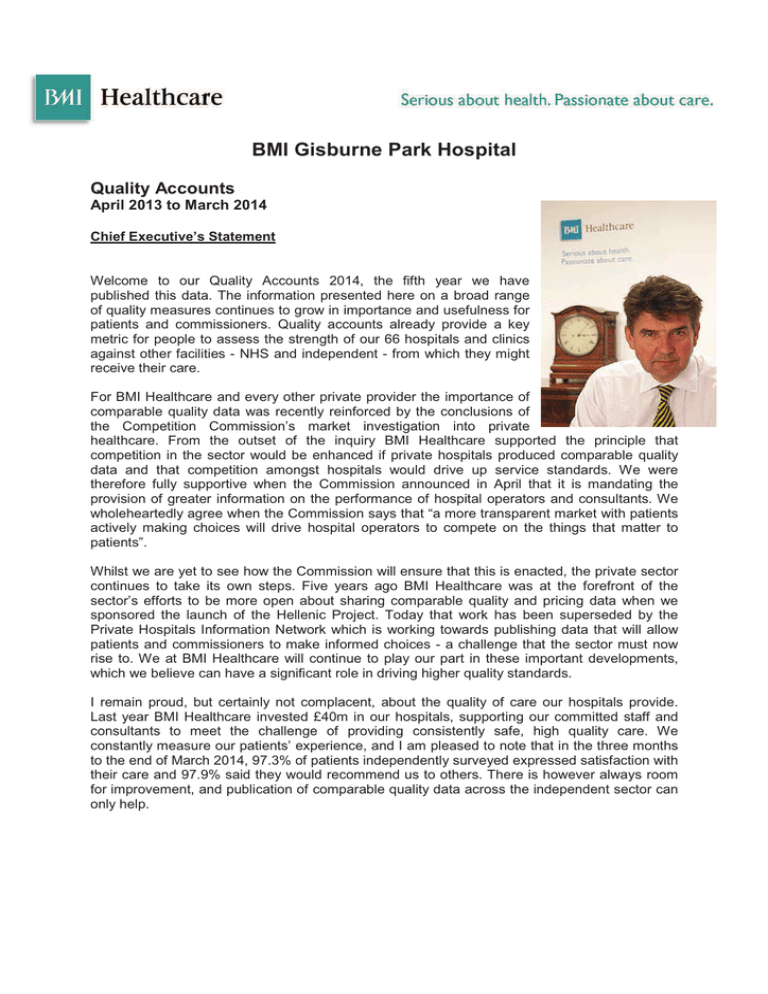
BMI Gisburne Park Hospital
Quality Accounts
April 2013 to March 2014
Chief Executive’s Statement
Welcome to our Quality Accounts 2014, the fifth year we have
published this data. The information presented here on a broad range
of quality measures continues to grow in importance and usefulness for
patients and commissioners. Quality accounts already provide a key
metric for people to assess the strength of our 66 hospitals and clinics
against other facilities - NHS and independent - from which they might
receive their care.
For BMI Healthcare and every other private provider the importance of
comparable quality data was recently reinforced by the conclusions of
the Competition Commission’s market investigation into private
healthcare. From the outset of the inquiry BMI Healthcare supported the principle that
competition in the sector would be enhanced if private hospitals produced comparable quality
data and that competition amongst hospitals would drive up service standards. We were
therefore fully supportive when the Commission announced in April that it is mandating the
provision of greater information on the performance of hospital operators and consultants. We
wholeheartedly agree when the Commission says that “a more transparent market with patients
actively making choices will drive hospital operators to compete on the things that matter to
patients”.
Whilst we are yet to see how the Commission will ensure that this is enacted, the private sector
continues to take its own steps. Five years ago BMI Healthcare was at the forefront of the
sector’s efforts to be more open about sharing comparable quality and pricing data when we
sponsored the launch of the Hellenic Project. Today that work has been superseded by the
Private Hospitals Information Network which is working towards publishing data that will allow
patients and commissioners to make informed choices - a challenge that the sector must now
rise to. We at BMI Healthcare will continue to play our part in these important developments,
which we believe can have a significant role in driving higher quality standards.
I remain proud, but certainly not complacent, about the quality of care our hospitals provide.
Last year BMI Healthcare invested £40m in our hospitals, supporting our committed staff and
consultants to meet the challenge of providing consistently safe, high quality care. We
constantly measure our patients’ experience, and I am pleased to note that in the three months
to the end of March 2014, 97.3% of patients independently surveyed expressed satisfaction with
their care and 97.9% said they would recommend us to others. There is however always room
for improvement, and publication of comparable quality data across the independent sector can
only help.
The information available in these quality accounts has been reviewed by the Clinical
Governance Board and I declare that as far as I am aware the information contained in these
reports is accurate. I thank all the staff whose energy and devotion to improvement is
represented here and, more importantly, in the experiences of every patient who steps across
our threshold.
Stephen Collier
Chief Executive Officer
BMI Gisburne Park Hospital
BMI Gisburne Park Hospital in Gisburne, Ribble Valley is part of BMI Healthcare, Britain's
leading provider of independent healthcare with a nationwide network of hospitals & clinics
performing more complex surgery than any other private healthcare provider in the country. Our
commitment is to quality and value, providing facilities for advanced surgical procedures
together with friendly, professional care.
BMI Gisburne Park Hospital is a Grade I listed building set in beautiful parkland with 35
bedrooms all offering the privacy and comfort of en-suite facilities, satellite TV and telephone.
The hospital has 2 theatres, 5 spacious Consulting Rooms and a fully equipped Physiotherapy
Suite. The Hospital offers Consultant led care across a variety of specialisms including
Orthopaedics, Spinal surgery, ENT, Pain management procedures and General Surgery.
BMI Gisburne Park Hospital ceased offering specialist care for people with alcohol and drug
dependency issues as from May 2013. As a result the care provided is predominantly a surgical
based service for adult patients only; children can be seen for consultations in the outpatient
area however are not able to have surgery or any invasive diagnostic procedures at BMI
Gisburne Park Hospital.
This specialist expertise is supported by caring and professional medical staff, with dedicated
nursing teams and Resident Medical Officers on duty 24 hours a day, providing care within a
friendly and comfortable environment.
BMI Gisburne Park Hospital has been providing services for both the Self pay and Private
Medical Insurance markets for over 25 years and for the last ten years we have worked in
conjunction with the NHS providing care initially through spot purchases and then through
choose and book. BMI Gisburne Park offers NHS care via patient choice under the Standard
Acute Contract and spot contracts with individual trusts/commissioners.
BMI Healthcare are registered as a provider with the Care Quality Commission (CQC) under the
Health & Social Care Act 2008. BMI Gisburne Park Hospital is registered as a location for the
following regulated services:•
•
•
Treatment of disease, disorder and injury
Surgical procedures
Diagnostic and screening
The CQC carried out an unannounced inspection on the 5th November 2013 and found that The
Gisburne Park Hospital was meeting all the required standards. The hospital has not been the
subject of any special reviews or investigations. The following five Standards were inspected:
Treating people with respect and involving them in their care
Providing care, treatment and support that meets people’s needs
Caring for people safely and protecting them from harm
Staffing
Quality and suitability of management
The Gisburne Park Hospital has a local framework through which clinical effectiveness, clinical
incidents and clinical quality is monitored and analysed. Where appropriate, action is taken to
continuously improve the quality of care. This is through the work of a multidisciplinary group
and the Medical Advisory Committee. The clinical team worked together closely to ensure the
care provided is of the highest standard. The Regional Clinical Quality Groups monitor and
analyse trends and ensure that the quality improvements are operationalised.
At corporate level the Clinical Governance Board has an overview and provides the strategic
leadership for corporate learning and quality improvement.
There has been ongoing focus on robust reporting of all incidents, near misses and outcomes.
Data quality has been improved by ongoing training and database improvements. New reporting
modules have increased the speed at which reports are available and the range of fields for
analysis. This ensures the availability of information for effective clinical governance with
implementation of appropriate actions to prevent recurrences in order to improve quality and
safety for patients, visitors and staff.
At present we provide full, standardised information to the NHS, including coding of procedures,
diagnoses, co-morbidities and PROMs for NHS patients.There are additional external reporting
requirements for CQC, Public Health England (Previously HPA) CCGs and Insurers
BMI is a founding member of the Private Healthcare Information Network (PHIN) UK – where
we produce a data set of all patient episodes approaching HES-equivalency and submit this to
PHIN for publication. The data is made available to common standards for inclusion in
comparative metrics, and is published on the PHIN website http://www.phin.org.uk. This website
gives patients information to help them choose or find out more about an independent hospital
including the ability to search by location and procedure.
1. Safety
1.1 Infection prevention and control
The focus on infection prevention and control continues under
the leadership of the Group Head of Infection Prevention and
Control, in liaison with the link nurse in Gisburne Park Hospital.
We have had: • Zero cases of MRSA bacteraemia in the last year (NHS
1.17cases/100,000 bed days).
• MSSA bacteraemia cases 0/100,000 bed days
• E.coli bacteraemia cases 0/100,000 bed days
• Zero cases of hospital apportioned Clostridium difficile in the last 12 months.
• SSI data is also collected and submitted to Public Health England for orthopaedic
surgical procedures. Our rates of infection are;
o Hips 0%
o Knees 0%
At Gisburne Park Hospital we conduct monthly hand hygiene audits and quarterly urinary
catheter care, peripheral vascular device, standard precautions, asepsis, isolation precautions
and transportation of specimens. It was clear from the result of the first audit of hand hygiene
that improvements were needed to be made within certain departments to comply with best
practice. A series of educational workshops were held in all departments to improve staff
knowledge of all the necessary steps required to comply with the High Impact Intervention audit.
Following this we saw 100% compliance with best practice.
As part of a monthly clinical training day, all clinical staff are assessed within hand hygiene and
ANTT combined with an e-learning module.
Environmental cleanliness is also an important factor in infection prevention and our patients
rate the cleanliness of our facilities highly.
Patient Satisfaction Scores - Cleanliness
ϵϲ͘ϰ
ϵϲ͘Ϯ
ϵϲ
ϵϱ͘ϴ
ĂƚŚƌŽŽŵůĞĂŶůŝŶĞƐƐ
ϵϱ͘ϲ
ZŽŽŵůĞĂŶůŝŶĞƐƐ
ϵϱ͘ϰ
ϵϱ͘Ϯ
й
s͘'ŽŽĚͬdžĐĞůůĞŶƚ
1.2 Patient Led Assessment of the Care Environment (PLACE)
We believe a patient should be cared for with compassion and dignity in a clean, safe environment.
Where standards fall short, they should be able to draw it to the attention of managers and hold the
service to account. PLACE assessments will provide motivation for improvement by providing a
clear message, directly from patients, about how the environment or services might be enhanced.
In 2013 we introduced PLACE, which is the new system for assessing the quality of the patient
environment, replacing the old Patient Environment Action Team (PEAT) inspections.
The assessments involve patients and staff who assess the hospital and how the environment
supports patient’s privacy and dignity, food, cleanliness and general building maintenance. It focuses
entirely on the care environment and does not cover clinical care provision or how well staff are
doing their job.
The results will show how hospitals are performing nationally and locally. The results below are from
the 2013 PLACE Audit, the 2014 audit has been completed, however, the results are not yet
published. Actions have been completed since the 2013 audit which will be reflected in the audit
most recently completed. The main focus has been improving the fabric of the building including
general freshening of décor, paintwork and floor coverings.
Year
Environment
Cleanliness
Food
Privacy & Dignity
2013
76.35%
96.69%
95.10%
89.66%
2012
Good
-
Good
Good
93.44%%
94.44%%
88.14%%
1.3 Venous Thrombo-embolism (VTE)
BMI Healthcare, holds VTE Exemplar Centre status by the Department of Health across its
whole network of hospitals including, The Gisburne Park Hospital. BMI Healthcare was
awarded the Best VTE Education Initiative Award category by Lifeblood in February 2013 and
were the Runners up in the Best VTE Patient Information category.
We see this as an important initiative to further assure patient safety and care. We audit our
compliance with our requirement to VTE risk assess every patient who is admitted to our facility
and the results of our audit on this have shown that we are consistently achieving 100%.
BMI Gisburne Park Hospital reports the incidence of Venous Thromboembolism (VTE) through
the corporate clinical incident system. It is acknowledged that the challenge is receiving
information for patients who may return to their GPs or other hospitals for diagnosis and/or
treatment of VTE post discharge from the Hospital. As such we may not be made aware of
them. We continue to work with our Consultants and referrers in order to ensure that we have
as much data as possible. In the year, April 2013 to March 2014 BMI Gisburne Park Hospital
reported zero incidence of VTE.
BMI Gisburne Park VTE Risk Assessment & Prophylaxis Audit conducted quarterly shows
100% compliance to the corporate Venous Thrombosis Prevention Policy.
The audit consists of;
Each ward or department admitting patients for day case or in-patient treatments
within a hospital is defined as being a unit, for the purpose of audit.
Each individual unit is required to audit 20 consecutive admissions per month.
The elements being audited are :Risk assessment on admission
Risk assessment within 24 hours of admission
Risk assessment after 7 days, or if patient condition changes
The audit is randomised by including a numeric patient identifier only.
Consultant and procedure details can be captured which allows the individual units
and hospitals to identify non-compliance.
2. Effectiveness
2.1 Patient reported Outcomes (PROMS)
Patient Reported Outcome Measures (PROMs) are a means of collecting information on the
effectiveness of care delivered to NHS patients as perceived by the patients themselves.
PROMs is a Department of Health led programme.
For the current reporting period, the tables below demonstrate that the health gain between
Questionnaire 1 (pre-operative) and Questionnaire 2 (post–operative) for patients undergoing
hip replacement and knee replacement at Gisburne Park Hospital.
Oxford Hip Score average
2012
*Gisburne
Park
Q1
Q2
Health gain (Q2 - Q1 average)
18.077
36.402
18.385
17.907
39.224
21.317
England
Copyright © 2011 Re-used with the permission of The Health and Social Care Information Centre. All rights reserved.'
Oxford Knee Score average
2011/2012
*Gisburne
Park
Q1
Q2
Health gain (Q2 - Q1 average)
21.923
36.538
14.615
18.893
34.902
16.01
England
Copyright © 2013, The Health and Social Care Information Centre. All Rights Reserved.
*Not enough patients to give accurate result
2.2 Enhanced Recovery Programme (ERP)
The ERP is about improving patient outcomes and speeding up a patient’s recovery after
surgery. ERP focuses on making sure patients are active participants in their own recovery and
always receive evidence based care at the right time. It is often referred to as rapid recovery, is
a new, evidence-based model of care that creates fitter patients who recover faster from major
surgery. It is the modern way for treating patients where day surgery is not appropriate.
ERP is based on the following principles:1. All Patients are on a pathway of care
a. Following best practice models of evidenced based care
b. Reduced length of stay
2. Patient Preparation
a. Pre Admission assessment undertaken
b. Group Education sessions
c. Optimizing the patient prior to admission – i.e HB optimisation, control comorbidities, medication assessment – stopping medication plan.
d. Commencement of discharge planning
3. Proactive patient management
a. Maintaining good pre-operative hydration
b. Minimising the risk of post-operative nausea and vomiting
c. Maintaining normothermia pre and post operatively
d. Early mobilisation
4. Encouraging patients have an active role in their recovery
a. Participate in the decision making process prior to surgery
b. Education of patient and family
c. Setting own goals daily
d. Participate in their discharge planning
BMI Gisburne Park hospital has an established a local ERP committee which is attended by the
Physiotherapy Manager, Ward & Outpatient manager, Senior ODP and the Hospital Manager
who has a clinical background. Data relating to ERP and any improvements are discussed at
clinical team meetings where appropriate.
Areas that are to be focused upon are;
•
Consultant education
•
Pre-operative carbohydrate loading
•
Review of medication used in Spinal Anesthetics’
•
Pre-operative warming of patients
2.3 Unplanned Readmissions within 31 days and unplanned returns to theatre.
Unplanned readmissions and unplanned returns to theatre are normally due to a clinical
complication related to the original surgery.
During the reporting year Gisburne Park Hospital re-admitted 3 patients within 31 days of
surgery and had 5 patients who had an unplanned return to theatre.
All of these variances are formally reported and discussed as the local Clinical Governance
Meetings and Medical Advisory Committee meetings to ensure that lessons learnt and changes
to practice are reviewed and appropriate changes made.
3. Patient experience
3.1 Patient satisfaction
BMI Healthcare is committed to providing the highest levels of quality of care to all of our
patients. We continually monitor how we are performing by asking patients to complete a patient
satisfaction questionnaire. Patient satisfaction surveys are administered by an independent third
party and Gisburne Park Hospital scored 97.8% Very Good or Excellent for Overall Rating of
Quality of Care.
ϵϴ
ϵϳ
йƐĐŽƌŝŶŐsĞƌLJ
'ŽŽĚŽƌdžĐĞůůĞŶƚ
ϵϲ
ĚŵŝƐƐŝŽŶ
ϵϱ
EƵƌƐŝŶŐ
ϵϰ
ĐĐŽŵŵŽĚĂƚŝŽŶ
ĂƚĞƌŝŶŐ
ϵϯ
KǀĞƌĂůů
ϵϮ
ϵϭ
ĚŵŝƐƐŝŽŶ EƵƌƐŝŶŐ
ĐĐŽŵ
ĂƚĞƌŝŶŐ
KǀĞƌĂůů
3.2 Complaints
In addition to providing all patients with an opportunity to complete a satisfaction survey BMI
Gisburne Park Hospital actively encourages feedback both informally and formally. Patients are
supported through a robust complaints procedure, operated over three stages:
Stage 1: Hospital resolution
Stage 2: Corporate resolution
Stage 3: Patients can refer their complaint to independent adjudication if they are not satisfied
with the outcome at the other 2 stages.
At Gisburne Park Hospital we continually strive to improve our services and listen to the
feedback we receive from our customers. This has resulted in a significant fall in the number of
complaints we have received over the past 12 months. Training carried out for frontline staff
during the last 12 months on dealing with the difficult customer and complaint resolution has
been a significant factor in the reduction of complaints.
In addition a structured approach to dealing with issues on a daily basis has recently been
implemented with a named senior manager being available each week day in the event that an
issue cannot be easily resolved or a more senior staff member is required.
4. CQUINS
In 2009 the NHS Commissioning Board introduced the Commissioning for Quality and
Innovation (CQUIN) framework. This was introduced to ensure improvements in the
quality of services and better outcomes for patients.During 2013 – 2014 BMI Gisburne
Park Hospital complied with the National CQUINS program as part of the contractual
arrangements with the local Clinical Commissioning Groups. Data was collected and
submitted for VTE Risk Assessment, the Patient Safety Thermometer and the Friends
and Family Test. The monthly audit of VTE assessment showed 100% compliance at
Gisburne Park Hospital.
The Patient Safety Thermometer which looks at the number of falls, and Health care
associated infection relating to urinary catheters similarly showed excellent results.
In addition to the National CQUIN’s there were also locally agreed CQUIN’s which for
2013-2014 included
1. Care Bundle Audits of Indwelling Urinary catheters. This measure looked at the
appropriate use of catheters and therefore reducing the likelihood of patients
having a Health Care Associated Infection.
Ϯ͘ Care Bundle Audits of Peripheral Vascular Access Devices. This measure was
similarly looking at the appropriate use and length of time peripheral devices
were used. By keeping the time the devices are in situ to a minimum this
reduces the likelihood of an infection.
ϯ͘ Post Discharge follow-up telephone calls. This measure required us to call
patients 24-48hrs after their discharge from hospital to ensure they were well
and were not experiencing any problems. If patients were found to be having
problems a member of the clinical team would speak with them and try and
resolve any issues.
CQUIN measure
TARGET
Apr13 – Mar14
Friends & Family
20%
21.9%
Safety
Thermometer
Yes
Yes
VTE Risk
Assessment
100%
100%
Post Discharge
Follow up calls
Number of PVD
infections
75%
99%
0
0
100%
100%
Management plan
in place for
indwelling
urinary catheters
5. National Clinical Audits
Gisburne Park Hospital was only eligible to participate in National Joint Registry audit and all
joint replacements are submitted to this.
6. Research
No NHS patients were recruited to take part in research.
7. Priorities for service development and improvement
The Senior Management team at BMI Gisburne Park hospital, supported by regional and
national colleagues is committed to a quality improvement plan that is linked to the business
strategy. To this effect the following priorities have been considered and are included within this
report:
• Audit compliance with national and local agreed CQUINS
• Ongoing engagement with our NHS commissioners to enhance patient choice and
service delivery to NHS patients monitored against quality indicators
• Process lead to continue to work closely with local GP’s and Practice Managers
• Introduction of daily ward rounds with the multidisciplinary team.
• Enhance communication by implementing LEAN within all departments of the hospital
• Pain management pathway including pre-post intervention physiotherapy and
psychological assessment.
• Pre-operative Physiotherapy inclusion to mitigate against patient referral back to GP.
8. Mandatory Quality Indicators
8.1 The value and banding of the summary hospital-level mortality indicator (SHMI) for BMI
Gisburne Park Hospital for the reporting period is due to be published in October 2014 and is
therefore unavailable for this report..
Unit
N/A
Reporting Periods
(at least last two
reporting periods)
Oct 11 – Jun 13
National
Average
Highest National
Score
Lowest National
Score
1.0006
1.1822
0.6735
8.2 The BMI Gisburne Park Hospital patient reported outcome measures scores for
(i) Groin hernia surgery
Unit
Reporting Periods
National
Highest National
(at least last two
Average
Score
reporting periods)
*
Apr 12 – Mar 13
0.083
0.157
*Not enough patients to give accurate result.
(ii) Varicose vein surgery – Unable to report as no data
Unit
Reporting Periods
National
Highest National
(at least last two
Average
Score
reporting periods)
N/A
Apr 12 – Mar 13
-8.738
8.172
Lowest National
Score
0.014
Lowest National
Score
-15.918
(iii) Hip replacement surgery
Unit
Reporting Periods
National
(at least last two
Average
reporting periods)
*18.385
Apr 12 – Mar 13
21.280
*Not enough patients to give accurate result.
Highest National
Score
Lowest National
Score
24.684
17.214
(iv) Knee replacement surgery during the reporting period.
Unit
Reporting Periods
National
(at least last two
Average
reporting periods)
*14.165
Apr 12 – Mar 13
15.99
*Not enough patients to give accurate result.
Highest National
Score
Lowest National
Score
20.37
12.2
8.3 (i) The percentage of patients aged 0-14 readmitted to a hospital which forms part of the
BMI within 28 days of being discharged from a hospital which forms part of the hospital during
the reporting period.
Unit
Reporting Periods
National
Highest National
(at least last two
Average
Score
reporting periods)
N/A
Apr 11 - Mar 12
11.45
14.35
No inpatient paediatric services provided at BMI The Lancaster Hospital
Lowest National
Score
7.96
8.3.(ii)The percentage of patients aged 15 or over readmitted to a hospital which forms part of
the BMI Gisburne Park Hospital within 28 days of being discharged from a hospital which forms
part of the hospital during the reporting period.
Unit
0.069%
Reporting Periods
(at least last two
reporting periods)
Apr 11 – Mar 12
National
Average
Highest National
Score
Lowest National
Score
10.01
14.51
5.54
8.4 The BMI Gisburne Park Hospital responsiveness to the personal needs of its patients during
the reporting period.
Unit
94.86%
Reporting Periods
(at least last two
reporting periods)
2012-2013
National
Average
Highest National
Score
Lowest National
Score
68.1
84.4
57.4
8.5 The percentage of patients who were admitted to BMI Gisburne Park Hospital and who were
risk assessed for venous thromboembolism during the reporting period.
Unit
100%
Reporting Periods
(at least last two
reporting periods)
Apr 13 – Jan 14
National
Average
Highest National
Score
Lowest National
Score
96
100
79
8.6 The rate per 100,000 bed days of cases of C difficile infection reported within the BMI
Gisburne Park Hospital amongst patients aged 2 or over during the reporting period.
Unit
0
Reporting Periods
(at least last two
reporting periods)
Apr 12 – Mar 13
National
Average
Highest National
Score
Lowest National
Score
17.3
30.8
0
8.7 The number and, where available, rate of patient safety incidents reported within the BMI
Gisburne Park Hospital during the reporting period, and the number and percentage of such
patient safety incidents that resulted in severe harm or death.
Number of patient safety incidents reported
Unit
300
Reporting Periods
(at least last two
reporting periods)
Apr 12 – Mar 13
National
Average
Highest National
Score
Lowest National
Score
44.55
1,810
0
National
Average
Highest National
Score
Lowest National
Score
7.76
30.95
1.68
Rate of patient safety incidents reported
Unit
6.96
Reporting Periods
(at least last two
reporting periods)
Apr 12 – Mar 13
Number of patient safety incidents that resulted in severe harm or death
Unit
0
Reporting Periods
(at least last two
reporting periods)
Apr 12 – Mar 13
National
Average
Highest National
Score
Lowest National
Score
0.64
28
0
Percentage of patient safety incidents that resulted in severe harm or death
Unit
0%
Reporting Periods
(at least last two
reporting periods)
Apr 12 – Mar 13
National
Average
Highest National
Score
Lowest National
Score
0.9
2.9
0.0
8.8 The percentage of staff employed by the BMI Gisburne Park Hospital during the reporting
period, who would recommend the BMI Gisburne Park Hospital as a provider of care to their
family or friends.
Unit
97%
Reporting Periods
(at least last two
reporting periods)
2013
National
Average
Highest National
Score
Lowest National
Score
64.58
96.43
33.73
9. Non-Mandatory Quality Indicators
9.1 The percentage of patients who received care as inpatients or discharged from A &E during
the reporting period, who would recommend the BMI Gisburne Park Hospital as a provider of
care to their family or friends.
Unit
88.45%
Reporting Periods
(at least last two
reporting periods)
Jun 13 – Jan 14
National
Average
66.23
Highest National
Score
94.38
Lowest National
Score
35.63

